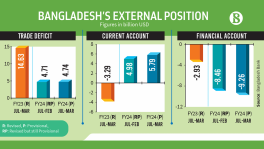VAT law comes to effect with many exemptions
Supplementary duty retained

The government is going to finally implement the VAT and Supplementary Duty Act, seven years after it was enacted, with a number of changes and exemptions.
Moving away from a universal 15 percent value-added tax (VAT) rate, the government will implement the law from July 1 in 2019-20 fiscal with five separate VAT slabs: 2 percent, 5 percent, 7.5 percent, 10 percent and 15 percent on certain goods and services.
As per the proposed budget for FY2020, the law has increased the limits on turnover tax and VAT waiver. The National Board of Revenue (NBR) is also dropping its earlier decision to give up the supplementary duty.
NBR is also going to ease the process of review and enforcement of the law at the field level. The law will keep both online and manual systems of VAT collection instead of online only as provisioned earlier in the original Act.
“Now there is no alternative to implementing the new VAT law as it has already been deferred several times,” said Mosharraf Hossain Bhuiyan, chairman of NBR and senior secretary to the Internal Resources Division of the Ministry of Finance.
The NBR chief said there will be a provision in the law for further addition and subtraction in the future, even though it is being implemented after several exemptions.
However, economists criticised the multilayer VAT system, instead of a uniform one.
Dr Ahsan H Mansur, executive director of Policy Research Institute of Bangladesh, said if the law is implemented in this fashion it will turn into trash.
The main merit of VAT Law is a universal rate, he said, adding that doing away with supplementary duty and leaving prices to the market was another important merit.
The Jatiya Sangsad (JS) passed the VAT law in 2012 but NBR had to defer its implementation time and again in the face of resistance from the business community.
In the original law framed with the World Bank (WB) financing, a universal VAT rate was fixed at 15 percent. To this end, online software was installed targeting VAT collection at this rate.
Owing to repeated objections from businessmen, the government, having drifted from the main merit of the law or the universal VAT rate, is now going to implement it at five different rates.
In implementing the VAT law, NBR is going to allow the highest exemption in the turnover tax ceiling.
The original VAT Act 2012 levied three percent tax on annual turnover up to Tk80 lakh, instead of Turnover VAT. In the proposed budget, the ceiling has been elevated to Tk3 crore and the tax rate to 4 percent.
The VAT-free turnover limit has also been raised to Tk50 lakh which was Tk30 lakh in the 2012 Act. This means businessmen will have to pay no VAT for sales and purchases up to the re-fixed ceiling.
The WB proposed the government do away with supplementary duty in the new law. But having yielded to businessmen, NBR is clinging to the supplementary duty on 1,400 commodities.
Although the duty is decreasing on some goods, it is increasing on mobile phone calls, air travel and registration of vehicles.
After passage in the JS, the multi-layer VAT will be effective from the beginning of the next fiscal.
From July 1, NBR will collect 2 percent in VAT from power sector, down from 15 percent earlier. Similarly, 2 percent VAT, instead of a tariff, will be imposed on essential commodities like medicine and rod.
There will be no supplementary duty on natural gas, while 5 percent VAT, instead of 15 percent, will be levied on internet and indenting firms. The existing eight percent VAT on English medium schools is coming down to 5 percent.
The Act also imposes 5 percent VAT on more than 100 essential commodities including food, most of which were under 15 percent VAT earlier.
The new Act proposes 7.5 percent and 10 percent VAT on most of the services. However, 15 percent VAT will remain as usual on luxury products and goods harmful to health.
During the last caretaker government tenure in 2007, the International Monetary Fund (IMF) recommended a new VAT law with a uniform VAT rate. The then government did not take it into cognizance, arguing that the time was not perfect to prepare the law.
After Awami League (AL) was voted into power in 2009, IMF again urged the government to enact the VAT law. In 2012, IMF granted Bangladesh about $100 crore loan under Extended Credit Facility (ECF) on condition of enacting the VAT law.
Complying with the condition, the AL government passed the law in the JS that year.
NBR took an initiative in 2015 to implement the law but backtracked in the face of serious objection from businessmen.
Even after the law was finally placed in the JS in the 2017 budget session, the prime minister deferred the passage of the Act for two years after businessmen opposed it.
The Act had various provisions including a universal VAT rate, waiver of tariffs and doing away with supplementary duty. But the NBR had been unable to fully implement any of those.


 Keep updated, follow The Business Standard's Google news channel
Keep updated, follow The Business Standard's Google news channel
















